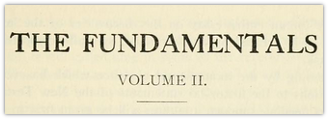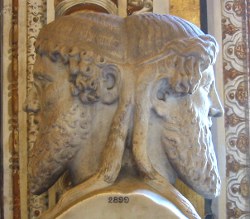Fallacies of the Higher Criticism
[node:22019 collapsed body]

CHAPTER III. FALLACIES OF THE HIGHER CRITICISM.
BY FRANKLIN JOHNSON, D. D., LL. D.
As iron sharpens iron,
one person sharpens another. (Proverbs 27:17)
[node:22019 collapsed body]

CHAPTER III. FALLACIES OF THE HIGHER CRITICISM.
BY FRANKLIN JOHNSON, D. D., LL. D.
My husband is a new pastor, looking for books on the development of the Synagogue and inter-testament worship of the Jews to suggest to someone as a resource. Any ideas would be appreciated. Thanks!

Mythology is everywhere (see Part 1), and there are biblical reasons that Christians should not necessarily break out in hives when they encounter mythology (see Part 2). The good news is that there can be much more to the Christianity-mythology relationship than narrow-eyed tolerance. There are numerous practical benefits to having a good understanding of mythology.
Knowing where we came from is just part of being an educated person. As one pastor has pointed out, we expect grade school students in Maryland to learn Maryland history—so as heirs of Hellenic and Latin civilizations, we owe it to ourselves to be somewhat knowledgeable about Greco-Roman culture.1 It’s simply our history.
We also have a Judeo-Christian history, but let us learn both instead of gravitating towards one over the other. Neither let us pretend that Christian history is pristine compared to the stories of polluted pagan mythology. Biblical history is nothing more than stories of God’s salvation of pagans.
One could argue that we are to be counter-cultural, and that is true in a certain sense. But being counter-cultural does not mean that we have to counter everything.2 At times, Paul argues from both creational and cultural norms.3 Creational norms are fixed, but there are also acceptable cultural reasons for acclimating ourselves to our surroundings. We may not like some aspects of our culture, but we should be educated in the culture that we find ourselves in.
 Read the series so far.
Read the series so far.
In the Bible, a people or nation is an ethnic unit that derives its solidarity largely from common descent. Of course, at one time the entire human race constituted a single people (Gen. 11:6). All humans descended in the first place from Adam, and secondarily from Noah. Before the tower of Babel, no ethnic or national differences existed. According to the Bible, these differences arose after God scattered the human race by confounding their languages. In other words, the division of nations is a result of God’s judgment upon human sin, though at the end of human history God is going to bring great glory out of this division—but more on that later.
As the table of nations in Genesis 10 makes clear, the human race was divided into an array of different peoples. As distinct nations, they were characterized by the different families from which they emerged, the different languages that they spoke, and the different territories that they occupied (Gen. 10:5). Additionally, either before or during the division of nations, humanity was becoming more and more corrupt. The apostle Paul describes this process in Romans 1:19-32. It is not clear exactly when the process reached its nadir. Yet Paul speaks of all three stages in God’s “handing over” (the term is paradidomi, which implies a handing over to judgment) in the aorist indicative, suggesting that, from his point of view, these judgments were already in force. Most likely the judicial “handing over” occurred during the early years of human history, and if the three stages were not complete before the scattering of the human race, they were certainly complete by the time it finished.
Poll Results
Besides the ultimate descendent of David, Jesus, which godly (or sometimes godly) king do you respect most?
David Votes: 5
Hezekiah Votes: 3
Josiah Votes: 6
Asa Votes: 0
Uzziah Votes: 0
Joash Votes: 0
Jehoshaphat Votes: 0
Solomon Votes: 1
“Christianity bears many similarities to a story, a language, a game and a culture. Hopefully, these analogies help to fill a need… But they were never the truth. They were vehicles for the truth.”
I’m trying to get a better understanding of Middle Knowledge …..
I’ve read several articles on both sides of the issue, and wondering if Middle Knowledge is really Biblical …
Does anyone have a good grasp of this issue, and whether or not there are serious problems with Middle Knowledge?

What will the world be like just before the second coming of Christ? Our Lord emphasized the enormous potential of global deception at that time.
In answer to the disciples’ urgent question: “What will be the sign of Your coming, and of the end of the age?” (NKJV, Matt. 24:3), our Lord warned them: “Take heed that no one deceives you. For many will come in My name, saying, ‘I am the Christ,’ and will deceive many…. Then many false prophets will rise up and deceive many…. For false christs and false prophets will rise and show great signs and wonders to deceive, if possible, even the elect” (Matt. 24:4-5, 11 22). Note the emphasis on the words “false” and “deceive” in our Lord’s answer.
One moment after the rapture of the church, every surviving religious leader in the world will be a false one. Yes, millions of good gospel tracts, books and recorded messages will still be here—but all born-again Christians will be gone. Human reflectors of the light of the world will be in heaven with their Savior. Suddenly, the worst person the world has even seen will introduce himself to the people of Israel, and will offer to them hope for security and military victory in the midst of a world that hates them. That person is the Antichrist. He is the one of whom the Lord Jesus spoke: “I have come in My Father’s name, and you do not receive Me; if another comes in his own name, him you will receive” (John 5:43).
 Read Part 1.
Read Part 1.
The ubiquity of mythology is undeniable, but to what degree should Christians interact with mythology? An answer in the third-century would most likely be in the negative if answered by the church father Tertullian, who famously asked, “What indeed has Athens to do with Jerusalem?” Tertullian didn’t have time for a “mottled Christianity,” mixed with Platonic philosophies or other heresies.
But what about an answer in the twenty-first century? What amount of involvement with pagan mythology is proper? Christians and non-Christians alike have had differing responses to this question.
Bradley Birzer writes,
To the modernist, “myth,” like religion, merely signifies a comfortable and entrenched lie. For the postmodernist, myth simply represents one story, one narrative among many; it is purely subjective, certainly signifying nothing of transcendent or any other kind of importance. For religious fundamentalists, myths also represent lies.1
Some fundamentalists may object to Birzer’s taxonomy, but I have witnessed a similar reaction by a fundamentalist leader. A few years ago, I presented this topic at a conference for educators, and at lunch, just before I held my workshop, I mentioned to an inquiring stranger2 that my workshop had to do with the benefits of mythology. He commented that it sounded like “benefits of paganism” and questioned whether there could be any benefits of paganism.3
Discussion